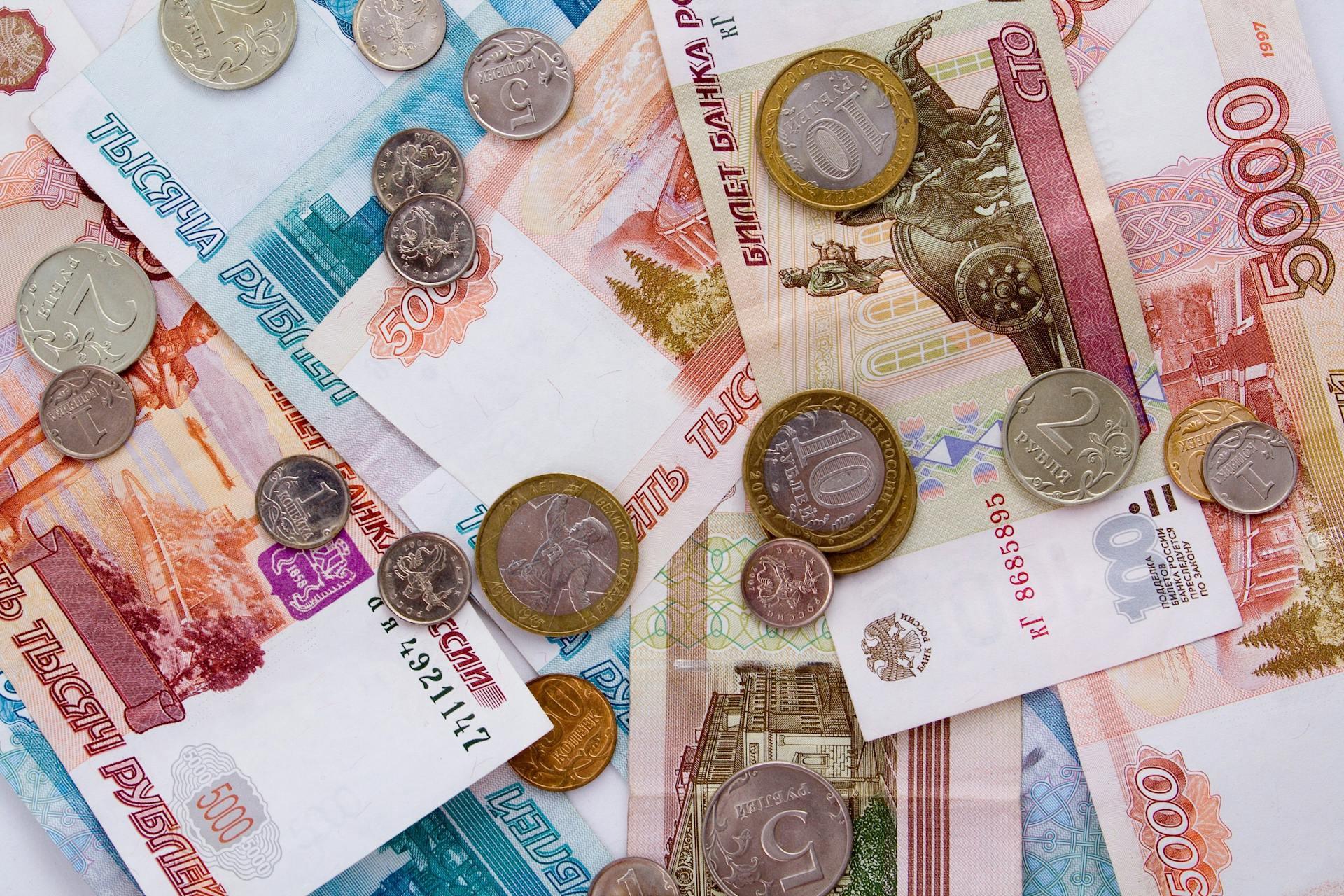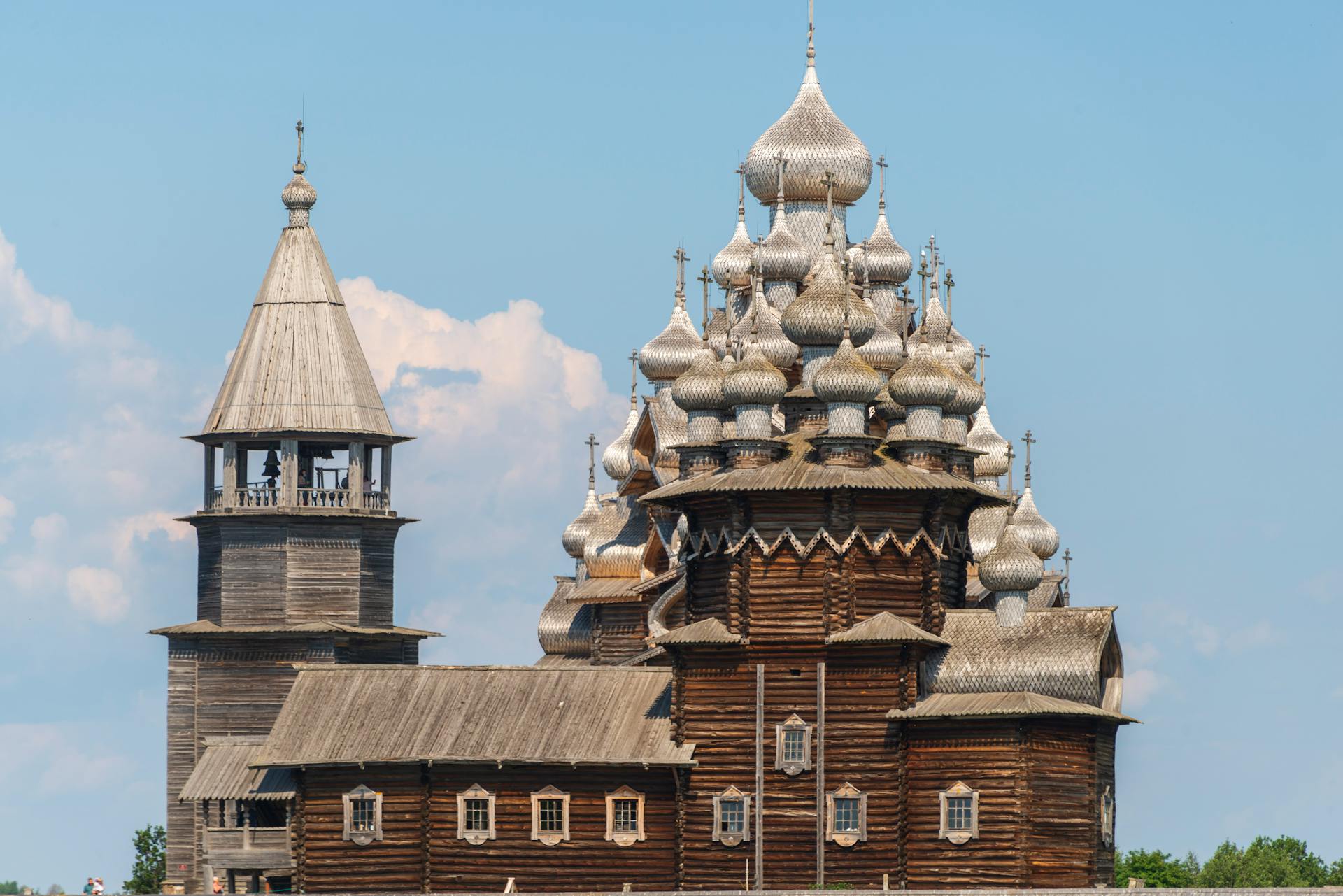
The Sberbank of Russia sanctions have far-reaching economic consequences for the country and its people. The bank's assets have been frozen, making it difficult for Russians to access their money.
The sanctions have led to a significant decline in the value of the Russian ruble, making imports more expensive and contributing to inflation. This has a ripple effect on the economy, impacting businesses and individuals alike.
The restrictions on Sberbank's operations have also caused a shortage of cash in Russia, as people are unable to withdraw their funds from the bank. This has resulted in long lines at ATMs and a lack of available cash in the economy.
For another approach, see: Sanctions Work
Asset Freeze
Sberbank, a major Russian bank, was added to the EU's asset freeze list in line with previous sanctions packages targeting Russia.
The EU imposed additional asset freeze restrictions on 58 individuals and 11 entities, including Sberbank, as from 21 July 2022.
Sberbank was previously only subject to EU capital market sanctions and barred from SWIFT, but this new designation adds to its restrictions.
The EU also designated AVLITA Stevedoring Company and the FORSS Group of Companies as part of the asset freeze list.
New reporting obligations require all persons subject to EU jurisdiction to report information on accounts and assets within EU jurisdiction belonging to or held/controlled by EU asset freeze parties.
EU asset freeze parties must report any funds and economic resources belonging to them to the competent authority of the EU Member State where the assets are located, before 1 September 2022.
Failure to report this information will be considered circumvention of EU sanctions, which is prohibited under the sanctions.
Export Ban
The EU has amended the list of items subject to export ban to Russia, narrowing the scope of restrictions for certain customs classification codes. This means that some previously restricted items are now allowed to be exported.
One notable addition to the ban is the inclusion of "Cooling towers and similar plant for direct cooling (without a separating wall) by means of recirculated water, designed to be used with the technology listed in this Annex." This item is subject to an authorization only for urgent prevention or mitigation of natural or human disasters.
The ban on providing Russian vessels access to EU ports will expand to include sea locks in EU territory after July 29, 2022. This is a significant change that affects the maritime industry.
Additionally, Member State authorities can now authorize access to EU ports and locks for vessels that have changed their Russian flag or registration to another State prior to April 16, 2022, if the access is necessary for unloading non-prohibited goods strictly necessary for completing renewable energy projects in the EU.
Economic Actions
Sberbank of Russia sanctions have had a significant impact on the country's economy. The US has prohibited transactions and dealings by US persons or within the US in new debt of longer than 14 days maturity and new equity of Russian state-owned enterprises.
Sberbank, Russia's largest financial institution, is one of the 13 major firms listed in Annex 1 to the Russia-related Entities Directive. This means they are heavily restricted from raising money through the US market.
The restrictions have limited the Kremlin's ability to raise money for its malign activity, including supporting the further invasion of Ukraine. The six largest financial institutions in Russia, including Sberbank, are now subject to these prohibitions.
The following Russian entities are subject to prohibitions related to new debt and equity:
- Sberbank
- Gazprombank Joint Stock Company
- Joint Stock Company Russian Agricultural Bank
- Public Joint Stock Company Gazprom
- Public Joint Stock Company Gazprom Neft
- Public Joint Stock Company Transneft (Transneft)
- Public Joint Stock Company Rostelecom
- Public Joint Stock Company RusHydro
- Public Joint Stock Company Alrosa
- Joint Stock Company Sovcomflot
- Open Joint Stock Company Russian Railways
Tighter Deposit Limits
The EU has imposed stricter rules on bank deposits from Russian nationals and entities.
Deposits exceeding EUR 100,000 are no longer allowed from Russian nationals or residents, as well as from entities established in Russia.
This ban also applies to entities in third countries that are majority-owned by Russian nationals or residents.
However, a new exemption allows for deposits necessary for non-prohibited trade between the EU and Russia.
Major Economic Actions
The US government has taken significant steps to limit Russia's ability to finance its invasion of Ukraine. OFAC issued Directive 3 under E.O. 14024 to prohibit transactions and dealings in new debt of longer than 14 days maturity and new equity of Russian state-owned enterprises and other entities.
Sberbank, Russia's largest financial institution, is now heavily restricted from raising money through the US market. This includes six of Russia's largest financial institutions, which are listed in Annex 1 to the Russia-related Entities Directive.
The US government has identified 13 major firms, including companies critical to the Russian economy, as subject to prohibitions related to new debt and equity. These firms are now heavily restricted from raising money through the US market.
The following entities are among those identified by OFAC as being owned or controlled by, or having acted or purposed to act for or on behalf of, the Government of Russia:
- Sberbank
- Gazprombank Joint Stock Company
- Joint Stock Company Russian Agricultural Bank
- Public Joint Stock Company Gazprom
- Public Joint Stock Company Gazprom Neft
- Public Joint Stock Company Transneft
- Public Joint Stock Company Rostelecom
- Public Joint Stock Company RusHydro
- Public Joint Stock Company Alrosa
- Joint Stock Company Sovcomflot
- Open Joint Stock Company Russian Railways
In addition, the following entities have been identified for operating or having operated in the financial services sector of the Russian Federation economy:
- Joint Stock Company Alfa-Bank
- Credit Bank of Moscow Public Joint Stock Company
- Sberbank
Sanctions on Financial Institutions
The US has imposed blocking sanctions on three major Russian financial institutions: Otkritie, Novikombank, and Sovcombank. These institutions hold combined assets worth $80 billion.
Otkritie, Russia's seventh largest financial institution, was designated for being owned or controlled by the Russian government. Its 12 subsidiaries, including an insurance company and a bank, were also designated.
Sovcombank, the third largest privately owned financial institution in Russia, was designated for operating in the financial services sector of the Russian economy. Its 22 subsidiaries, including various financial services companies in Russia and Cyprus, were also designated.
Novikombank, a state-owned bank, was designated for operating in the financial services sector of the Russian economy. It primarily serves the Russian defense sector and is owned by Rostec, a Russian defense company.
A different take: Russia Largest Banks
New Measures
Sberbank of Russia sanctions have led to new measures being implemented to mitigate their impact.
The European Union has restricted Sberbank's access to its market, effectively freezing its assets.
This move is aimed at limiting the bank's ability to finance Russian military activities.
Sberbank's shares have plummeted in value as a result of the sanctions.
The bank's market capitalization has been significantly reduced.
The US has also imposed restrictions on Sberbank's operations, including prohibiting US banks from providing services to the bank.
This measure is part of a broader effort to isolate Russia's financial sector.
Sberbank's customers are facing difficulties in accessing their accounts due to the sanctions.
Some customers have reported being unable to withdraw cash or conduct transactions.
Too Small to Fail?
Sberbank of Russia is a bank that's been hit hard by sanctions. It's one of the largest banks in Russia, with a market share of around 30%.
The sanctions were imposed because of Russia's actions in Ukraine, which led to a significant increase in tensions between the two countries. Sberbank has been accused of supporting the Russian government's actions, which has further exacerbated the situation.
Sberbank's CEO, Herman Gref, has been a vocal supporter of the Russian government's actions in Ukraine. He's also been a key player in the bank's efforts to navigate the sanctions.
Here's an interesting read: How Far Is Ukraine from Russia?
The sanctions have had a significant impact on Sberbank's operations, with many of its international transactions being blocked. This has made it difficult for the bank to conduct business with other countries.
Sberbank has been trying to adapt to the new reality, but it's clear that the sanctions are having a major impact on the bank's operations.
Frequently Asked Questions
Which Russian bank is not sanctioned?
Gazprombank is the largest Russian bank not previously sanctioned by the US, according to OFAC. It's reportedly used for military purchases and compensating soldiers.
Sources
- https://www.whitecase.com/insight-alert/eus-7th-package-russia-sanctions-targets-gold-sberbank-and-fine-tunes-existing
- https://home.treasury.gov/news/press-releases/jy0608
- https://www.bruegel.org/blog-post/european-union-should-sanction-sberbank-and-other-russian-banks
- https://www.politico.eu/article/ecb-declares-sberbanks-european-subsidiary-likely-to-fail/
- https://bankingjournal.aba.com/2022/03/treasury-announces-sanctions-against-russian-defense-companies-sberbank-ceo/
Featured Images: pexels.com


